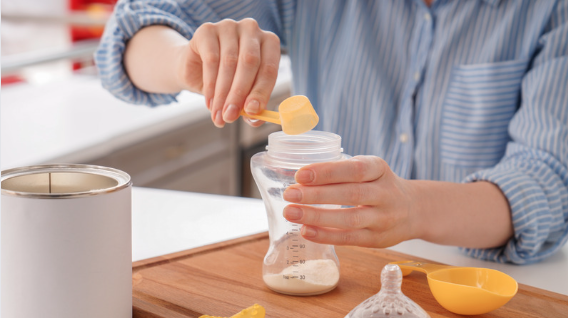Recent Articles

Getting Started With Solids
Empower Your Baby's Journey to Solid Foods with Levaapp
Embark on the exciting adventure of introducing solids to your little one with Levaapp's comprehensive guide. Discover when and how to introduce purees, move onto chunkier textures, and embrace self-feeding. Equip yourself with expert advice on introducing a sippy cup and spoon, all while ensuring your baby's nutritional needs are met with wholesome, delicious foods.
Keywords: solids, baby food, purees, sippy cup, spoon, nutrition, healthy eating, weaning, parenting

Formula Guilt and How To Combat It
We strongly believe here at Leva that all families have the right to choose how they want to nourish their babies, guilt-free! Our philosophy is that breast milk and formula should both be viewed as feeding options rather than opposing viewpoints. As if being a new parent isn't hard enough, many of our moms talk about dealing with guilt or shame for giving formula to their baby despite formula being a safe form of infant nourishment.

How Supplementing Helps Some Moms Breastfeed Longer
It’s most breastfeeding moms’ goal to be able to provide all the nourishment their little one needs from latching at the breast alone, but like many things in life, the ideal plan isn’t what always comes to fruition. Some moms that have been around the breastfeeding block before are familiar with the term “triple feeding,” and most let out groans of displeasure when they hear it. It’s no secret that adding extra steps to the feeding routine can be a monumental amount of work. So what is supplementing anyway, and how can it be used to your benefit?

When Can I Stop Giving Formula To My Baby?
It can be confusing to navigate all the changes your baby quickly goes through in what seems like the blink of an eye! They grow and develop so fast, even when we wish they would stay little, just a tiny bit longer! One of the big milestones they will experience is the transition away from bottles and formula toward regular foods.

Why An App?
Vanessa’s vision has materialized in the development of the Leva App. One of the most well-rounded and inclusive baby apps on the market to date, the app:
Tracks breastfeeding, including which side the mother is feeding from and how long the feeding session lasts.
Tracks pumping sessions and bottle feedings.
Tracks diaper counts, including wet and dirty diapers, and consistency and color of the stool to give moms an idea of whether their baby is feeding well.
Has a milestone tracker. It provides information on what milestones babies should reach and at what age (according to the CDC), and provides advice on what to do if their baby is not achieving the milestones.
Has over 200+ high-quality, well-researched, and science-backed articles written by lactation consultants, pediatricians, doctors, physical therapists, psychologists, and career coaches.
Provides access to real one-on-one help with live consultants and coaches.
Provides on-demand video content developed by experts.

The Benefits of Hand Expression
One of the most important things that I teach new parents during every single one of my consultations is hand expression. Hand expression refers to the manual removal of colostrum/milk using your hands rather than directly latching your baby or using a pump.

Feeding on Demand
Unfortunately for all the type-A people that love a scheduled plan, babies don’t feed based on a timed schedule but instead need to be fed on demand. That means they may want to eat every hour for a while and then space out feedings to every 4 hours at other times. The recommendation is that you feed your baby whenever they indicate that they are hungry.

Your Baby at Four Months
At four months, it is the end of the newborn era and the beginning of the infant age! Four-month milestones are a lot of fun to follow and explore, so stay informed but also remember to enjoy this journey with your baby.

RSV Infection in Infants
Respiratory syncytial virus (RSV) rates are rampant this year, leaving many parents concerned about their babies. RSV is a respiratory virus (like the common cold or covid-19) that can infect people of any age. Still, those with compromised immune systems and infants under 6 months of age are at the highest risk of having severe, even potentially life-threatening cases.

Can I Take Cough Mixture While Breastfeeding?
Certain cough syrups may also pose a potential danger to the infant. It is good to understand why and what ingredients to watch out for.

How Does Exercise Affect My Breastmilk?
However natural breastfeeding is, it may not come easy for some moms - many of us have to put in a lot of effort to increase our milk supply. So it is no wonder that we were very wary of anything that may compromise that precious nectar, including exercise.

When Should I Give My Baby Water?
Water is essential for life. The human body needs water to function properly because it carries nutrients and oxygen to cells, protects body organs and tissues, and helps the kidneys and liver flush out waste products. Water essentially balances all our bodily systems. An adult should drink about 3 liters of fluid per day.
However, as counterintuitive as it may seem, babies under the age of six months should not be fed water, read on to learn why.

The Benefits of Babywearing
Babies that are "worn" in a carrier benefit on an emotional level because they crave close contact with their caregivers. Studies have shown that it can lead to 43% less crying, especially in the late hours of the day when they may be exhausted. Babies feel more comforted and cry less when carried closely. Read on to learn more about the benefits of carrying your baby in a sling.

Night Terrors in Children
After a long day of learning and playing, the best feeling in the world is to tuck that sleepy little face into bed. You hope that your little one will fall sound asleep and not wake up until the morning. However, many children experience night terrors or sleep disturbances, which can make life difficult for everyone. Night terrors can cause long-term sleep issues, so it is essential that you know how to deal with them. In this article, you will learn about night terrors, what they are, why they occur, and how to prevent them.

Constipation in Toddlers
When your child was a baby, their bowel patterns were different. As your baby grows, the gastrointestinal tract matures, and the number of bowel movements per day decreases. Some sources say that children should generally have at least one bowel movement per day or a bowel movement at least three to four times a week. Therefore, it is essential to identify your child's usual bowel pattern so that if it deviates from their typical pattern, you will be aware that something might be wrong, or it may be constipation.

How Much Weight Should My Baby Gain?
One of the most exciting things about being a parent is watching your baby grow. However, it's sometimes difficult to know how fast your baby should grow or whether they are putting on the right amount of weight for their age. This article will outline the average weight of your baby at birth, how much weight your baby should gain every week until they are a few months old, what affects their weight gain, and when you should be worried about your baby’s weight gain.

Why Do Newborns Lose Hair on Their Heads?
If you are a first-time parent, you might wonder if hair loss is normal for infants. Read on to find out more about the patterns of hair growth and hair loss in babies and why hair loss occurs. You will also learn when your baby's hair will grow back and what you can do to prevent your baby's hair from falling out.

Observing Your Worry
Having a newborn is a constant source of worry for new moms. These negative feelings accompany us through every stage of life and get more intense once we deal with the uncertainty of being responsible for another human being. However, when worries spin out of control can be very detrimental and bring a lot of anxiety. Therefore, observing and being aware of your worry allows you to manage it better.

How Do I Know If My Baby is Teething?
Infants express themselves by crying and fussing, and as parents, our job is to decipher the cries and meet our baby's needs. However, what happens when we don't know the reason our babies are crying? Usually, at around the three-month mark, we start to attribute teething as the reason our babies become fussy. Yet, how do we tell if our babies are teething?

When To See the Doctor if Your Baby Has a Cold
Coughs and colds are some of the most common complaints for which a parent seeks advice from their doctor for their baby. Most of the time, coughs and colds are harmless and go away independently, causing only minor inconveniences and minimal worry. However, there are times that coughs and colds become more serious and can disrupt your baby’s routines and daily activities. This article will describe what causes cough and colds, when you should see a doctor, and when you should worry about your child's symptoms.

